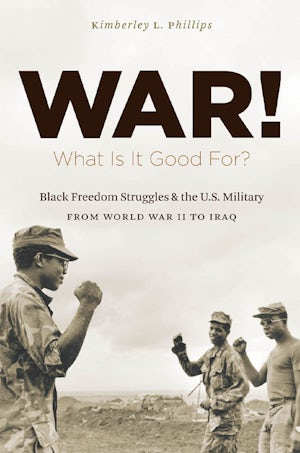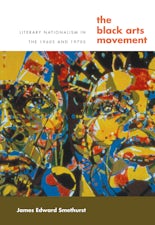War! What Is It Good For?
Black Freedom Struggles and the U.S. Military from World War II to Iraq
By Kimberley Phillips Boehm
360 pp., 6.125 x 9.25, 8 halftones, notes, index
-
Paperback ISBN: 978-1-4696-1389-5
Published: February 2014 -
E-book PDF ISBN: 979-8-8908-8271-4
Published: January 2012 -
E-book EPUB ISBN: 978-0-8078-6908-6
Published: January 2012
John Hope Franklin Series in African American History and Culture
Buy this Book
- Paperback $39.95
- E-Book $19.99
For Professors:
Free E-Exam Copies
Awards & distinctions
2013 Philip Taft Labor History Award
A 2013 Choice Outstanding Academic Title
Using an array of sources--from newspapers and government documents to literature, music, and film--and tracing the period from World War II to the Iraq and Afghanistan wars, Phillips considers how federal policies that desegregated the military also maintained racial, gender, and economic inequalities. Since 1945, the nation's need for military labor, blacks' unequal access to employment, and discriminatory draft policies have forced black men into the military at disproportionate rates. While mainstream civil rights leaders considered the integration of the military to be a civil rights success, many black soldiers, veterans, and antiwar activists perceived war as inimical to their struggles for economic and racial justice and sought to reshape the civil rights movement into an antiwar black freedom movement. Since the Vietnam War, Phillips argues, many African Americans have questioned linking militarism and war to their concepts of citizenship, equality, and freedom.
About the Author
Kimberley L. Phillips is dean of the School of Humanities and Social Sciences and professor of history at Brooklyn College, City University of New York.
For more information about Kimberley Phillips Boehm, visit
the
Author
Page.
Reviews
“This work will be indispensable to understanding why so many black men and women serve, and how their service both advances and limits them. Essential. All levels/libraries.”--Choice
“A well-written volume, one worth reading.”--Journal of American History
"Will undoubtedly appeal to many scholars of American cultural history and African American history."--Diplomatic History
“Required reading for scholars of the U.S. military and the (so-called) “long civil rights movement.”--American Historical Review
“This book is an important examination of the connections between military service and the civil rights movement.”--Southern Historian
"In this smart and moving book, historian Kimberley L. Phillips traces the intertwining of military service and the long civil rights movement even as she explores the often devastating effects of U.S. militarization before and after Jim Crow."--Pacific Historical Review



